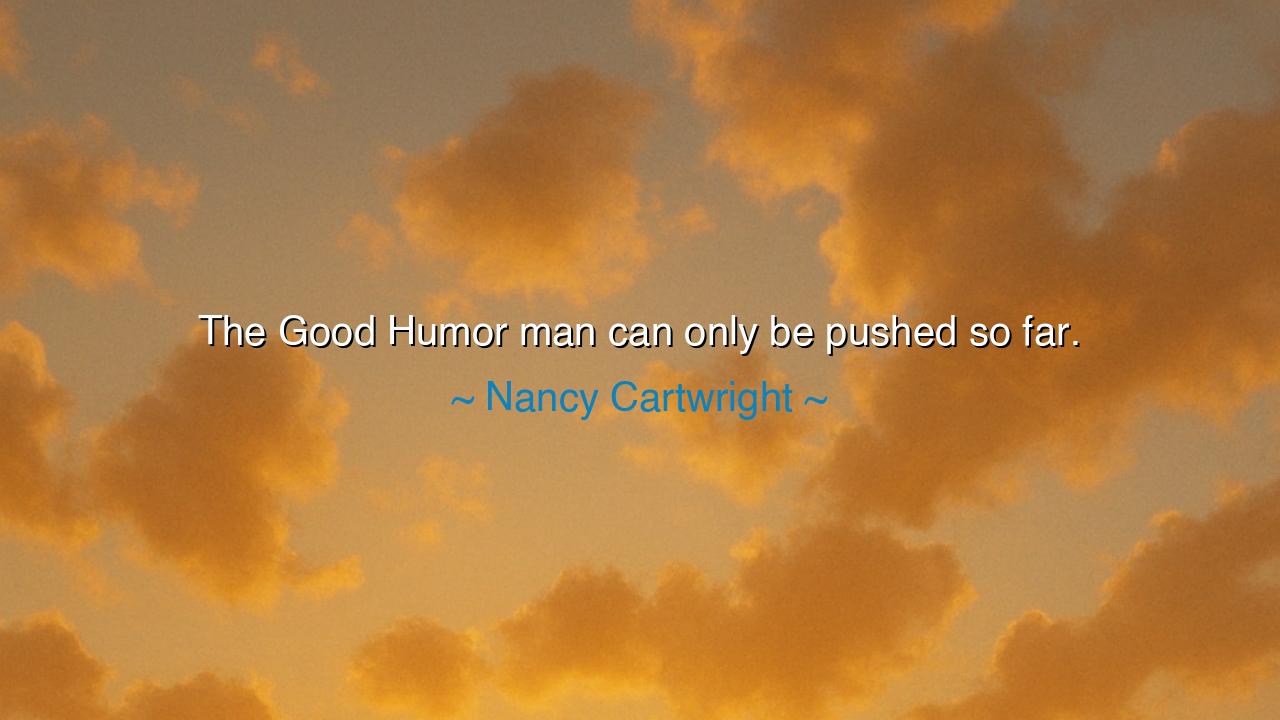
The Good Humor man can only be pushed so far.






In the grand arena of human existence, where the forces of joy and sorrow intertwine, there exists a deep and powerful truth: even the most good-natured among us have their limits. The words of Nancy Cartwright—"The Good Humor man can only be pushed so far"—speak to this ancient wisdom. It is a truth recognized by the greatest philosophers and sages throughout the ages: the gentle and the kind can bear much, but there is a point beyond which even their patience and goodness will break. It is not the absence of goodness that defines a person, but the recognition that even the purest must protect themselves from being overburdened.
Aristotle, the ancient philosopher, spoke of virtue as the balance between excess and deficiency. In his teachings, the virtuous person is neither too hard nor too soft, but finds the golden mean—the middle path that avoids extremes. Patience, kindness, and humor are virtuous qualities, but when pushed to their limits, they can become like water trapped behind a dam—no matter how gentle the current, there is a point when the pressure becomes too great, and the dam will break. Cartwright’s words are a reminder that those who give the most of their light are not invincible. Their generosity, their good humor, must be respected and not abused. For when it is taken too far, it can lead to an outpouring of emotion that is hard to contain.
The story of Hercules, the great hero of Greek mythology, offers an example of this very principle. Though Hercules was known for his strength and his goodness, even he had his limits. One of the Twelve Labors, a task that seemed impossible, was the capture of the Ceryneian Hind—a sacred deer of Artemis. Hercules, tasked with the job, chased the animal relentlessly, and though his patience and virtue guided him, the journey tested him beyond what even he could bear. In moments of intense pressure, even the greatest hero can falter. Like the Good Humor man, even the most noble of hearts can be driven to their breaking point, unable to continue without relief.
Similarly, the Stoics of ancient Rome, such as Seneca and Epictetus, often spoke of the importance of maintaining one's composure and peace in the face of adversity. Epictetus taught that while we cannot control external circumstances, we can control our responses. However, even the Stoics understood that one must not be pushed to the point of cruelty or suffering. It is within the bounds of virtue to set healthy limits, to recognize when one’s good nature is being exploited, and to act in self-defense when necessary. The wise do not allow themselves to be overburdened, for they know that even the strongest of souls needs space to breathe and grow.
Cartwright’s words also echo the lessons taught by Gandhi, whose nonviolent approach to resistance was one of the most profound examples of good humor and patience in the face of great adversity. Gandhi’s resilience in the fight for Indian independence was tested time and time again, as he faced oppression and personal hardship. His humor and good nature inspired millions, but he too knew his limits. When the pressure became too great, Gandhi would retreat into silence and reflection, allowing his spirit to recharge and renew itself. The lesson from his life is clear: it is not the absence of suffering or anger that makes us strong, but our ability to recover and refocus our energies.
And so, we find that the greatest strength is not in endless giving without limit, but in the wisdom to know when to pause. The Good Humor man, though always ready to offer a smile and a laugh, must recognize when his spirit is exhausted, when his kindness is being exploited, and when his boundaries are being overrun. It is a delicate dance between the virtues of generosity and the need for self-preservation. The most noble among us are those who can offer their goodness without losing themselves, who can say, “I give, but I will not give until I have nothing left to offer.”
The lesson here is clear and vital. In our own lives, we must be mindful of the balance between giving and preserving. While it is noble to offer our time, our humor, and our compassion to others, we must also know the importance of setting boundaries. We must recognize that no matter how much we wish to help, there is a point when we must withdraw in order to recharge and maintain our own health and strength. The Good Humor man is a symbol not of endless self-sacrifice, but of the wisdom to recognize one’s limits and the strength to protect one’s own spirit. In doing so, we become better able to serve others, to share our light without extinguishing it. Let us carry this wisdom forward, recognizing that true strength is not in unending giving, but in the ability to recognize our limits and act with both compassion and self-respect.






AAdministratorAdministrator
Welcome, honored guests. Please leave a comment, we will respond soon